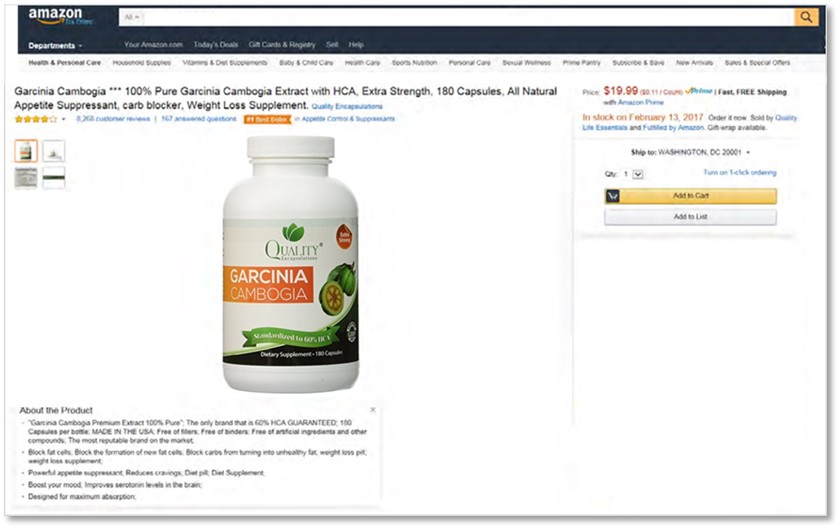Washington, DC - In explaining FTC cases, we try to give readers a behind-the-scenes perspective and sometimes the most accurate insights are out of the mouths of corporate insiders. In the FTC’s first case challenging fabricated reviews on an independent retail site, consider an email from the CEO of Brooklyn-based Cure Encapsulations about a weight loss pill it was selling.
Writing to an outfit that promised to “push your product towards the top” of Amazon by using bogus, paid-for reviews, the CEO said:
“As I told you yesterday, I need 30 reviews 3 per day.
Because of my upcoming holiday, I will not be able to watch my reviews not to get sabotaged by competition.
The goal of my competition is to bring me down to a 4.2 overall rating, and I need to be at 4.3 overall in order to have the sales.
I am sending you now another $200 and will pay you total of $1000 additional to the cost of the reviews if you stand on the product, and make sure the next 12 days if someone post a negative review you add real positive reviews from real aged accounts (no proxy vpn vps) to make it back to a 4.3 overall.”
A few minutes later, the CEO followed up with this message: “Please make sure my product should stay a five star.”
100% of the company’s $12.8 million in sales were generated on Amazon. That’s where the defendants claimed their Quality Encapsulations Garcinia Cambogia supplement was a powerful appetite suppressant, caused significant weight loss, and “block[ed] the formation of new fat cells.” Not surprisingly, the FTC challenged those claims as deceptive.
But the more intriguing aspect of the case is the company’s use of what the FTC alleges are false five-star reviews on Amazon. Here are just a few examples of what purportedly satisfied customers were supposedly saying about the defendants’ product:
- “Wow. I’m actually still amazed that it worked way faster than I expected. I have lost 20 pounds by using these amazing capsules. The pills help you with your intake of food, cleans all toxins from your body and does not allow fat or sugar to stick. Highly recommended!”
- “I used Garcinia Cambogia for few weeks. Feeling great now! Lost about 10 pounds! Amazing and safety product. A very good product! 5 Star!!!”
- “I am in-love with this product. It is amazingly simple to use but extremely effective. I lost around 8 pounds in roughly weeks of use and best part of it is I don’t get hungry. I have also noticed that i have been feeling amazing everyday since i began using the pill. Best of all, i have noticed no negative side effects and have had great weight loss results.”
- “At first I was skeptical about purchasing these since they aren’t exactly cheap supplements but I can tell you that these supplements really do work and I based my purchase off of findings and research. I have lost 10 pounds in the first week of using these. I will definitely be recommending this to my family and friends.”

Except they weren’t truthful reviews and they weren’t posted by actual purchasers. They were phonies fabricated by one or more third parties paid by the defendants to generate fake reviews on Amazon – a practice the FTC alleged to be false and deceptive.
In addition to requiring future weight loss and disease claims to be supported by clinical testing, the settlement in the case includes a financial judgment of $12.8 million, which – based on the defendants’ financial condition – will be partially suspended upon the payment of $50,000 to the FTC and the payment of their outstanding 2017 federal and state tax obligations. (Of course, if it turns out the defendants haven’t been truthful about their finances, the FTC reserves the right to ask the court to make the full amount due immediately.)
The proposed order includes additional provisions worth noting. First, the defendants must send an FTC-approved email to everyone who bought the garcinia cambogia pills, letting them know about the false advertising case and attaching a National Institutes of Health fact sheet that says, among other things, “Garcinia cambogia has little to no effect on weight loss.” What’s more, the defendants must contact Amazon, identifying all reviews on the site that they or people working for them bought.
The message to marketers couldn’t be clearer: The use of bills-for-shills product reviews violates the FTC Act.